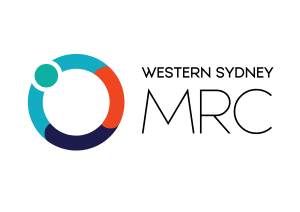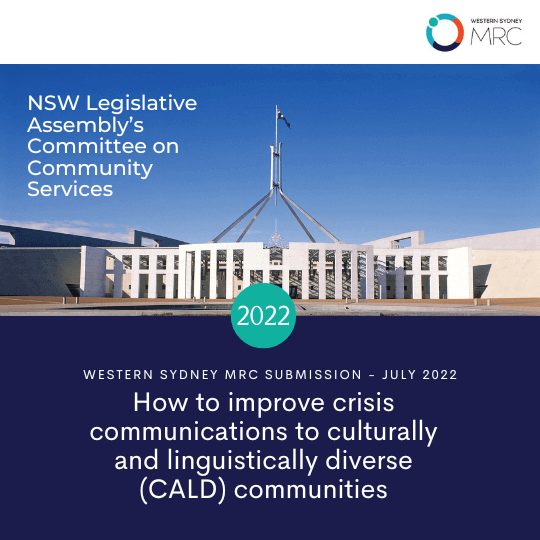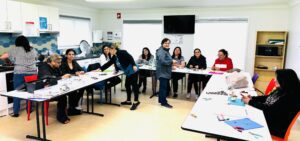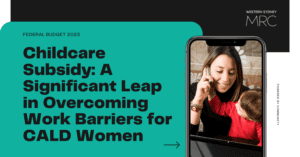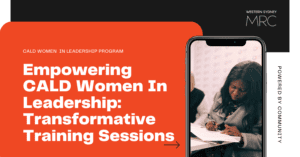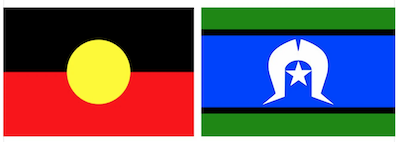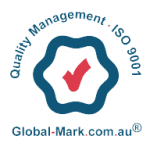Western Sydney Migrant Resource Centre (Western Sydney MRC) is a community-based non-profit organisation established to actively and directly relieve people and communities from diverse backgrounds whose social condition finds them disadvantaged. We aim to promote the principles of access and equity for diverse communities and identify and promote particular disadvantaged groups’ needs to ensure that no one is left behind. Underpinning our principles are the core values of Human Rights.
The organisation has been at the centre of diverse communities in Liverpool and surrounding LGAs for the past 42 years. Employing trust-building strategies with localised place-based supports, we have become an integral community asset for over 44 cultural associations, such as African, Iraqi, Italian, Syrian, Iranian, Indian, Vietnamese, Chaldean Catholic, Assyrian Orthodox, Mandaean, Muslim, Pacific Islander, Spanish, and Aboriginal and Torres Strait Islander communities, to name a few.
Working on the ground providing a key liaison role between the city, state and federal government during the COVID-19 Delta outbreak in July – December 2021, we have first-hand knowledge and experience of the crisis communications (or lack thereof) in culturally and linguistically diverse communities (CALD). Working with our team of bi-cultural staff, who work and live in the area, we were able to navigate the challenges of the ‘infodemic’ (misinformation and disinformation surrounding COVID-19 vaccines) and collaborate with community cultural/faith leaders to respond to evolving situation whilst disseminating public health guidelines rapidly.
Western Sydney MRC welcomes the opportunity to provide a submission into the inquiry by the New South Wales Legislative Assembly’s Committee on Community Services on ‘How to improve crisis communications to culturally and linguistically diverse (CALD) communities. We recognise the importance and urgency of this inquiry and support the government’s efforts to develop a multicultural engagement strategy informed by lived experiences. We hope our direct feedback on crisis communications issues will add robustness and authenticity to the engagement strategies.
Visit the website for more information on the inquiry:
Key Issues
Communications with CALD communities have been fragmented and inaccessible for people who speak a language other than English at home. The Southwest Sydney area, specifically Liverpool LGA, where Western Sydney MRC is located and operates, has 49% of the population or 32,511 residents who speak a language other than English. The key issues we have identified around crisis communications are:
- Insufficient (and in some cases inaccurate) translation services or translated materials
- Fractured trust in government institutions affects how public health communication is received
- Lack of diversity and inclusion in public health policies and crisis communications from the government
- Negative representations of CALD groups in health communications and general media reporting, especially from lower socio-economic geographies
- Retrofitting community/faith leaders’ engagement in Crisis Communication implementation.
Evidence
Communication during crises can save lives. We have experienced this first hand, working on the ground in some of the most vulnerable ‘hotspots’ of New South Wales during the July 2021 COVID-19 Delta outbreak. Below are some of the challenges we have identified, supported by relevant research:
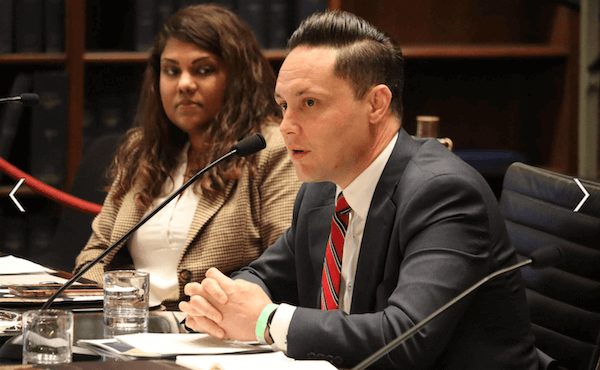
Insufficient (and in some cases inaccurate) translation services or translated materials
At the beginning of the COVID-19 pandemic, information about the virus and related public health measures changed daily. The mis/disinformation circulated by social media further perpetuated the challenges of rapidly evolving/changing information. For those not equipped with English language skills, the lack of translated communications resulted in public health non-compliance fines and sickness and death at worst. From July 2020 – October 2021, the government sought $1.1 million from ‘offenders’ in Liverpool for failing to wear or carry a mask, self-isolate if directed, lying to contact tracers, and so on. Regarding COVID-19, mortality for those with a country of birth overseas was three times that of people born in Australia. That is 6.8 deaths per 100,000 people versus 2.3 deaths.
Working with over 44+ cultural and faith groups in South West Sydney, Western Sydney MRC was aware of the gaps in translation services (iv) and resources. While NSW Health and Multicultural NSW were doing a commendable job in quickly publishing translations of the constantly changing public health information, some communities/language groups felt left out. For instance, the Fijian community noted a lack of resources in Fijian. The Fiji Diaspora Women’s Alliance Inc representative noted that while most of the community has some knowledge of English, their comprehension/language fluency is low. The outcome of limited translation services or translated resources is that the community avoids any type of engagement, leaving them vulnerable in crises.
Fractured trust in government institutions affects how public health communication is received
Several studies examining the impacts of COVID-19-related lockdown and compliance measures have identified a fracture in communities’ trust in government institutions. Especially with the ‘hotspots’ identified in lower socio-economic areas receiving more punitive measures than those in higher socio-economic areas. This immediately impacted the financial situation of residents living in these areas. The Australian Bureau of Statistics reported that in October 2021, Inner South West Sydney had an unemployment rate of 8.8% relative to Sydney city, which was 5.7%. Residents of South West Sydney felt othered and overlooked, fracturing their trust in the government’s ability to care for them.
Western Sydney MRC surveyed 155 families in South West Sydney during the initial days of lockdown to understand where CALD communities would like to get their health communications from. About 24% of responses referred to local community organisations as the best place to receive pandemic-related health communications. The second choice was local GPs at 23%. The reason is, that the authentic and ongoing engagement local place-based organisations provide to CALD communities is agile enough to respond immediately and relevantly to the evolving nature of crises. Research studies also note that CALD communities, specifically refugees and migrants, are strongly collectivistic; therefore, they trust and rely on similar collectivistic communities rather than the State.
Lack of diversity and inclusion in public health policies and crisis communications from the government
The public health policies and related communications are often framed using mainstream cultural values as their reference point with unintended consequences of inequity and exclusion for certain groups. Research identifies the ineffectiveness of COIVD-19 health policies that do not include lived experience of historically oppressed groups (refugees and asylum seekers) in policy advisory teams. When the COVID-19 daily briefings were announced every morning on national TV by the Chief Medical Officer, the information was not being received by some CALD groups. This is because the policy and health planning processes lacked community inclusive consultations, CALD champions and community leaders.
As the case managers and social workers at Western Sydney MRC were having one-on-one check-ins with their clients in South West Sydney during the pandemic, the misalignment between mainstream values of independence and the CALD community’s values of interdependence became obvious. For instance, under the COVID-19-related stay-at-home rules, families could not visit anyone outside their physical home. But multigenerational living is common among CALD communities. Even when extended family members do not live in the same house, they are still considered family with specific responsibilities for care and connection. The lack of CALD values representations in the policies and communications led to deteriorating mental health and stress for these families.
Negative representations of CALD groups in health communications and general media reporting, especially from lower socio-economic geographies.
Experiences of racism and discrimination are an underlining theme across the life journey of most CALD groups, especially those from refugee and asylum seeker backgrounds. During COVID-19, this intensified, creating clear lines of distinction between those who ‘disobeyed the rules/CALD groups’ and those who ‘followed the rules/non-CALD groups’. Studies have noted the stigmatising rhetoric about the virus’s origins in Asian Australians leading to a “racialisation of public health crises”.
This ‘othering’ and visible policing of CALD groups in some hotspots, especially in NSW, caused miscommunication and mistrust amongst residents.
Western Sydney MRC conducted several CALD community consultations in various Southwest Sydney Local Government Areas such as Liverpool, Fairfield, and Canterbury-Bankstown and found mental health and wellbeing a key community concern. Further discussions revealed the interplay between racial discrimination and housing, education, employment, and social cohesion. While mainstream discourses and popular media represented CALD groups as vaccine-hesitant, our internal research with 155 families found that lack of access and multi-lingual messaging were primary reasons for low vaccine uptake. As soon as vaccines were readily available in Australia, South West Sydney had the fastest growth in vaccination coverage in the entire nation.
Retrofitting community/faith leaders’ engagement in Crisis Communication implementation
The one thing that crisis management in CALD contexts has revealed is the pivotal role played by informal community cultural/faith leaders and representatives. The expectation of most Australians is that local governments, that is, City councils, will be the first port of refuge for information, communication, rescue, and respite. Nevertheless, it has become abundantly clear that in crisis situations, local governments do not have the capacity to navigate the challenges at hand. The experiences from the COVID-19 pandemic also showcased a gap in communications between governments at all levels – City, State and Federal. This led to ad hoc measures of retrofitting community/faith leader engagement in crisis communications and engagement.
Due to Western Sydney MRC’s historical connections and collaborations, we quickly assembled the first community care online forum in the South West Sydney region where the Delta outbreak was quickly emerging. Having identified gaps in the relationship of most governments (City, State, and Federal) with local CALD communities, we quickly deployed our multicultural engagement strategy, which gave voice to community leaders and provided a platform for direct connection between them and government entities such as NSW government, Liverpool City Council, NSW Health, and NSW Police. Evolving impacts of the virus and lockdown measures were directly and quickly disseminated to the authorities, who could then adapt their plans accordingly.
Recommendations
- Expand the range of languages in which crisis communications are disseminated. Tailor messages in simple ways using images, text, audio and video.
- Dedicated media infrastructure for South/ Western Sydney, subsidised by the government (newspapers, radio, social media and TV) to enable tailored and trusted messaging to CALD communities.
- Develop public health campaigns and wellbeing infrastructure in partnership with trusted local community-based organisations to ensure the visibility of CALD communities in communication planning and delivery.
- Employ strength-based and empowering strategies when addressing CALD groups, especially from vulnerable backgrounds normalising their diverse CALD family structures, living arrangements and cultural values
- Proactively include CALD communities in crisis communications, planning and integrating them with emergency management systems for tailored response and recovery.
Sincerely
Kamalle Dabboussy
